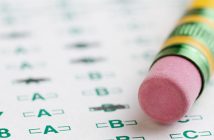 (Photo: Sam D, Creative Commons)
(Photo: Sam D, Creative Commons)
The question of why income inequality continues across generations is difficult to answer. But two economists may have found a link that could provide some information, writes Josh Zumbrun for The Wall Street Journal.
Poor students who were raised in areas that had high levels of income inequality are statistically more apt to drop out of high school than pupils who grew up in neighborhoods with a less of a gap.
Economists Melissa Kearney at the University of Maryland and Phillip Levine at Wellesley College wrote:
“Greater educational attainment is a key pathway by which an individual from a low-income background can move up in the income distribution and obtain a middle-class life, or potentially even higher.”
“If children from low-income backgrounds are responding to large gaps between their economic reality and middle-class life by dropping out of school, that would perpetuate economic disadvantage and impeded rates of upward mobility.”
The gap they found between families at the 50th percentile and those at the 10th percentile is a predictor of whether young males will leave high school before graduating. They theorize that boys at the 10th percentile level believe they may not be able to attain even a middle-class income level.
Approximately 25% of boys whose mothers dropped out of high school drop out of high school themselves if they live in an elevated inequality state. But 19% of boys whose moms dropped out of high school dropped out as well even if the amount of economic inequality in which they lived was low.
Dropping out of high school is one of the worst decisions a person can make when it comes to being economically damaged. And drop-outs have not only lower earnings but also significantly higher rates of unemployment. People who complete high school earn, on average, roughly $200 more weekly.
And college graduates make over double what high school dropouts earn. According to these statistics, getting a diploma equals accruing almost half a million dollars over a person’s lifetime.
Those with higher levels of education are dramatically less apt to be unemployed, particularly during an economic downturn such as the latest recession at which time one in six high school drop-outs were unemployed. One in 20 college graduates were out of work during the worst recession since the Great Depression.
The study was entitled “Income Inequality, Social Mobility, and the Decision to Drop Out of High School,” and found that the prevailing theory among economists, that the tougher the times, the higher the peoples’ incentive to work harder and the more young people are able to believe hard work will result in economic success.
The Brookings study suggests the opposite is true — that young people give in to hopelessness and are prone to lose faith in themselves and their futures during economic hard times, writes David Love of the Atlanta Blackstar.
Kearney and Levine found that in states with high rates of inequality, such as Louisiana, Washington, D.C., Mississippi, and Georgia, one-quarter of students do not graduate from high school in four years. In lower inequality states such as Vermont, Nebraska, Wisconsin, and North Dakota, only 10% of high school students do not graduate on time.
Kearney calls the problem “economic despair.” She shares data from the Department of Education that the median earnings of young people who do not have a diploma were $23,900 om 2013. For those who graduated from high school, it was $30,000, and for those with a bachelor’s degree, it was $48,500, reports Tami Luhby of CNN.
Students who drop out of high school also have an unemployment rate of 7.3% compared to 5.3% for high school graduates and 2.5% for young people with bachelor’s degrees.
The authors state that policies and programs are needed such as expanding mentor programs to low-income kids, programs in schools that aim to establish high expectations for students and providing ways for students to see themselves as the “college-going type,” relays the Brookings Papers on Economic Activity website.



